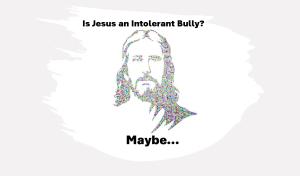To hear some Christians, Jesus sounds like some kind of “free love” bell-bottomed hippy from the seventies. This Jesus only cares about tolerance, inclusivity, “love,” and charitable work (feeding the hungry and clothing the naked). Now, Jesus did speak about love and what the Catholic Church calls “the seven corporal acts of mercy,” but He spoke and taught so much more. In fact, some of His teachings (and the teachings of St. Paul) may come off as just plain mean and even bullying by the Christians mentioned above. These “difficult” teachings of Jesus often get ignored by those who wish to paint a sunnier and more inclusive Jesus.
To round out a clearer of image of “the image of the invisible God,” one must address His most difficult (at least for today) teachings. This article lays out the difficult teachings of Jesus for all to see and contemplate. All must come to terms with the real Jesus, no matter our ideological (left or right) preferences. Now, allow me to introduce you to the real Jesus (bell-bottoms not included).
The Difficult Teachings of Jesus
The following verses reflect teachings of Jesus many modern readers may find unpalatable.
Luke 14:26 (Hate)
If anyone comes to me and does not hate his own father and mother and wife and children and brothers and sisters, yes, and even his own life, he cannot be my disciple.
Matthew 10:34-36 (The Sword)
Do not think that I have come to bring peace to the earth. I have not come to bring peace, but a sword. For I have come to set a man against his father, and a daughter against her mother, and a daughter-in-law against her mother-in-law. And a person’s enemies will be those of his own household.
Matthew 7.13-14 (Exclusion)
Enter by the narrow gate. For the gate is wide and the way is easy that leads to destruction, and those who enter by it are many. For the gate is narrow and the way is hard that leads to life, and those who find it are few.
Matthew 13:41-43 (Hell)
The Son of Man will send his angels, and they will gather out of his kingdom all causes of sin and all law-breakers, and throw them into the fiery furnace. In that place there will be weeping and gnashing of teeth. Then the righteous will shine like the sun in the kingdom of their Father. He who has ears, let him hear.
In the above verses, Jesus tell us to “hate” and that He did not come to bring peace but the “sword.” Moreover, He teaches to enter by a “narrow gate,” not the wide way that leads to destruction. Finally, He teaches that the “Son of Man” will send His angels to gather “all causes of sin and all lawbreakers” and throw them into a “fiery furnace” (Hell). One may ask: where is the Jesus of “love” and “mercy?”
Jesus on “Hate”
Clearly, Jesus uses hyperbole in His reference to “hate” in Luke 14:26. According to the commentary provided by the United States Conference of Catholic Bishops (USCCB), Jesus’ uses “hate” in the context of dedication:
This collection of sayings, most of which are peculiar to Luke, focuses on the total dedication necessary for the disciple of Jesus. No attachment to family (Lk 14:26) or possessions (Lk 14:33) can stand in the way of the total commitment demanded of the disciple. Also, acceptance of the call to be a disciple demands readiness to accept persecution and suffering (Lk 14:27) and a realistic assessment of the hardships and costs (Lk 14:28–32).
As disciples of Jesus, our love and dedication to Jesus is paramount. Therefore, all other affections must pale in comparison, even to the point of appearing as “hate.”
He Brought a Sword?
Moreover, Jesus claiming to bring “a sword” does not mean that He desires violence. Jesus, as the Word of God incarnate, brings truth—and truth divides. Catholic Daily Reflection sums this up perfectly:
This passage above offers us the sobering reality that by rejecting all forms of relativism and by holding onto Truth, we also run the risk of division, even with those in our families. This is sad and this hurts. Jesus offers this passage especially to strengthen us when this happens. If division happens as a result of our sin, shame on us. If it happens as a result of the Truth (as offered in mercy), then we should accept it as a result of the Gospel. Jesus was rejected and we should not be surprised if that happens to us, too.
If we find ourselves at odds with those who despise Truth, we also find ourselves in excellent company (Jesus), the Way, the Truth, and the Life.
The Narrow Gate of Exclusion
In a previous article, I wrote about the wide and easy way that leads to destruction. In Matthew 7:13-14, Jesus tells us that few find the narrow gate and the hard way leads to life. All those who reject falsehood and embrace the Truth will find the way hard and narrow. They love Christ and His commands more than their own life, more than their own pride. They find their life at odds with those who pridefully desire their own “way” over that of the Way.
See, I have set before you today life and good, death and evil. (Deuteronomy 30:15)
Furthermore, the narrow gate and the hard way exclude evil. No one who enters through this Way takes their sins with them.
Did He Really Mean “Hell”?
Those who tend towards a sunnier Jesus tend to overlook that He did in fact speak plainly about very uncomfortable things (and not just about money). Jesus taught about an actual Hell. Interestingly, at the end of the parable of the sheep and goats (the one with corporal acts of mercy), Jesus warns that the goats “go away into eternal punishment,” while the sheep (the righteous) enter “into eternal life” (Matthew 25:46).
Moreover, in Matthew 13:41-43, Jesus teaches that “all causes of sin and all law-breakers,” He sends His angels to cast into a “fiery furnace” where they experience “weeping and gnashing of teeth…” All this talk about “fiery furnaces,” “weeping and gnashing of teeth,” and “eternal punishment” seems harsh coming from someone some Christians tell us His main message concerns tolerance, inclusivity, and love.
What to Make of This Jesus?
In the Jesus presented above, there appears to be an extreme lack of tolerance, inclusivity, and love. This Jesus tells us to love Him above all others and that the truth He brings divides even our closest familial relationships.
This Jesus sounds like an intolerant bully by today’s societal standards.
Furthermore, some Christians seek to sidestep this Jesus for another more palatable one who does not judge and welcomes all on their own terms. And while this Jesus appeals to many in our modern world, this Jesus does not exist and cannot save anyone from their sin, as the only unforgiven sins are unconfessed sins. Unlike the Jesus reflected above, the Jesus of tolerance, inclusivity, and love possesses no ability to tell good apart from evil and therefore possess no ability to protect his sheep from thieves and robbers that seek “to steal and kill and destroy.” Conversely, the true Good Shepherd is the Truth and His sheep listen to His voice.
Final Thoughts…
In conclusion, many who read this article will misunderstand its purpose. No, I do not think Jesus an intolerant bully. I DO think that His teaching on love, truth, and Hell makes Him a bully according to the standards of our modern culture, standards many Christians (even Catholics) currently buy into. This “tolerant, inclusive, and loving” Jesus never existed. He exists now only in the minds of those who desire a Jesus who bends His knee to their will and sees things their way.
Let us all set aside our own “ideal” Jesus and accept Him as He really is.
Thank you!
Read The Latin Right’s other writing here.














